Comprehensive Analysis: Operations Management at Next Plc Report
VerifiedAdded on 2023/06/10
|10
|3087
|420
Report
AI Summary
This report provides a comprehensive analysis of operations management practices within Next Plc, a UK-based multinational company in the clothing, footwear, and home appliances sector. The report begins with an introduction to operations management and its significance in enhancing organizational efficiency. The main body of the report delves into Next Plc's operational management practices, specifically focusing on Total Quality Management (TQM) and its various principles, such as customer focus, employee involvement, and process-centered approaches. It evaluates the influence of these practices on organizational efficiency and highlights the benefits and challenges associated with TQM implementation. Furthermore, the report examines the adoption of specific technologies, including digital stores and artificial intelligence, within Next Plc to improve operations, customer experience, and supply chain management. It also explores supporting functions linked with operational management practices and how they contribute to the company's success, such as human resources and marketing. The report concludes by summarizing the key findings and implications of the analysis.

CW1 Written Assignment
Paraphrase This Document
Need a fresh take? Get an instant paraphrase of this document with our AI Paraphraser
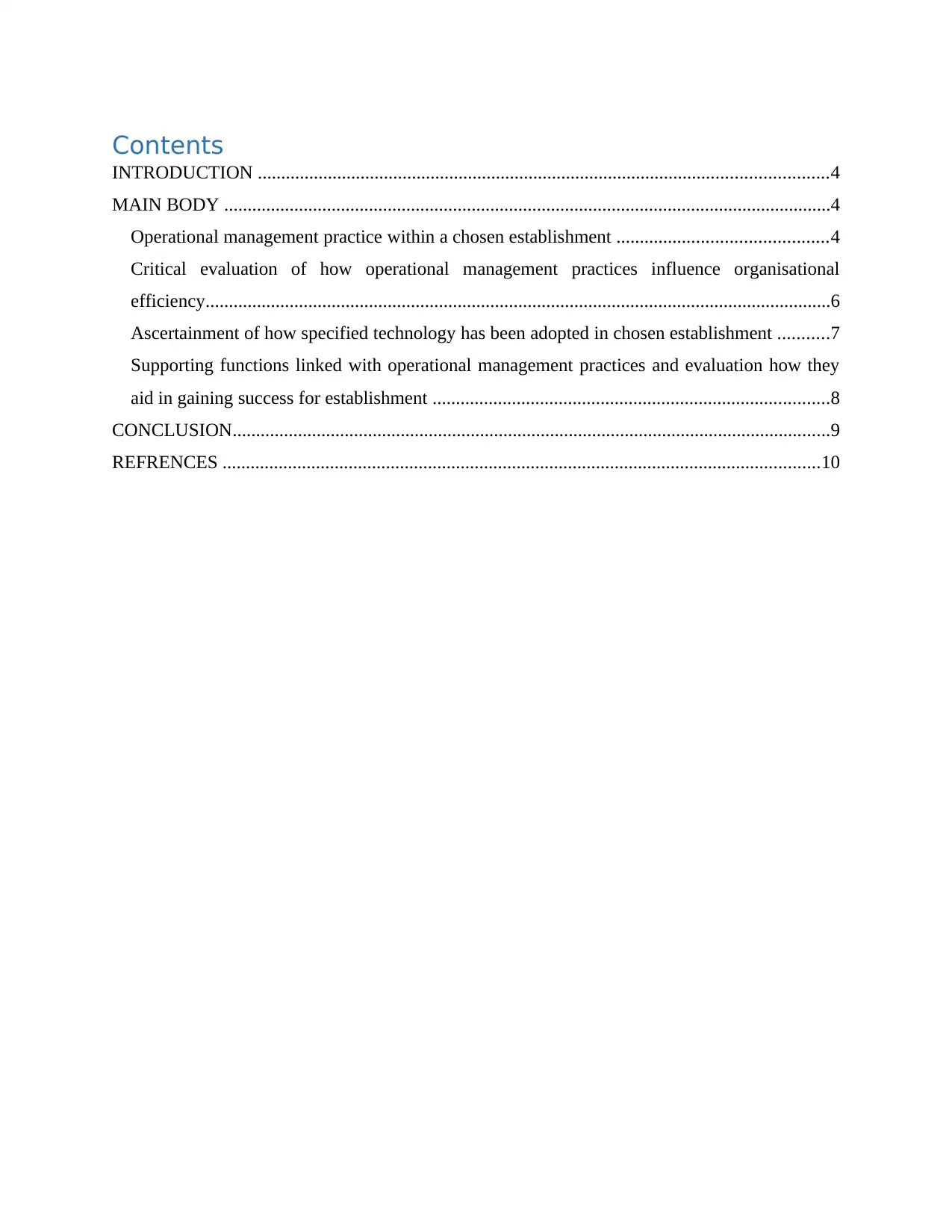
Contents
INTRODUCTION ..........................................................................................................................4
MAIN BODY ..................................................................................................................................4
Operational management practice within a chosen establishment .............................................4
Critical evaluation of how operational management practices influence organisational
efficiency......................................................................................................................................6
Ascertainment of how specified technology has been adopted in chosen establishment ...........7
Supporting functions linked with operational management practices and evaluation how they
aid in gaining success for establishment .....................................................................................8
CONCLUSION................................................................................................................................9
REFRENCES ................................................................................................................................10
INTRODUCTION ..........................................................................................................................4
MAIN BODY ..................................................................................................................................4
Operational management practice within a chosen establishment .............................................4
Critical evaluation of how operational management practices influence organisational
efficiency......................................................................................................................................6
Ascertainment of how specified technology has been adopted in chosen establishment ...........7
Supporting functions linked with operational management practices and evaluation how they
aid in gaining success for establishment .....................................................................................8
CONCLUSION................................................................................................................................9
REFRENCES ................................................................................................................................10
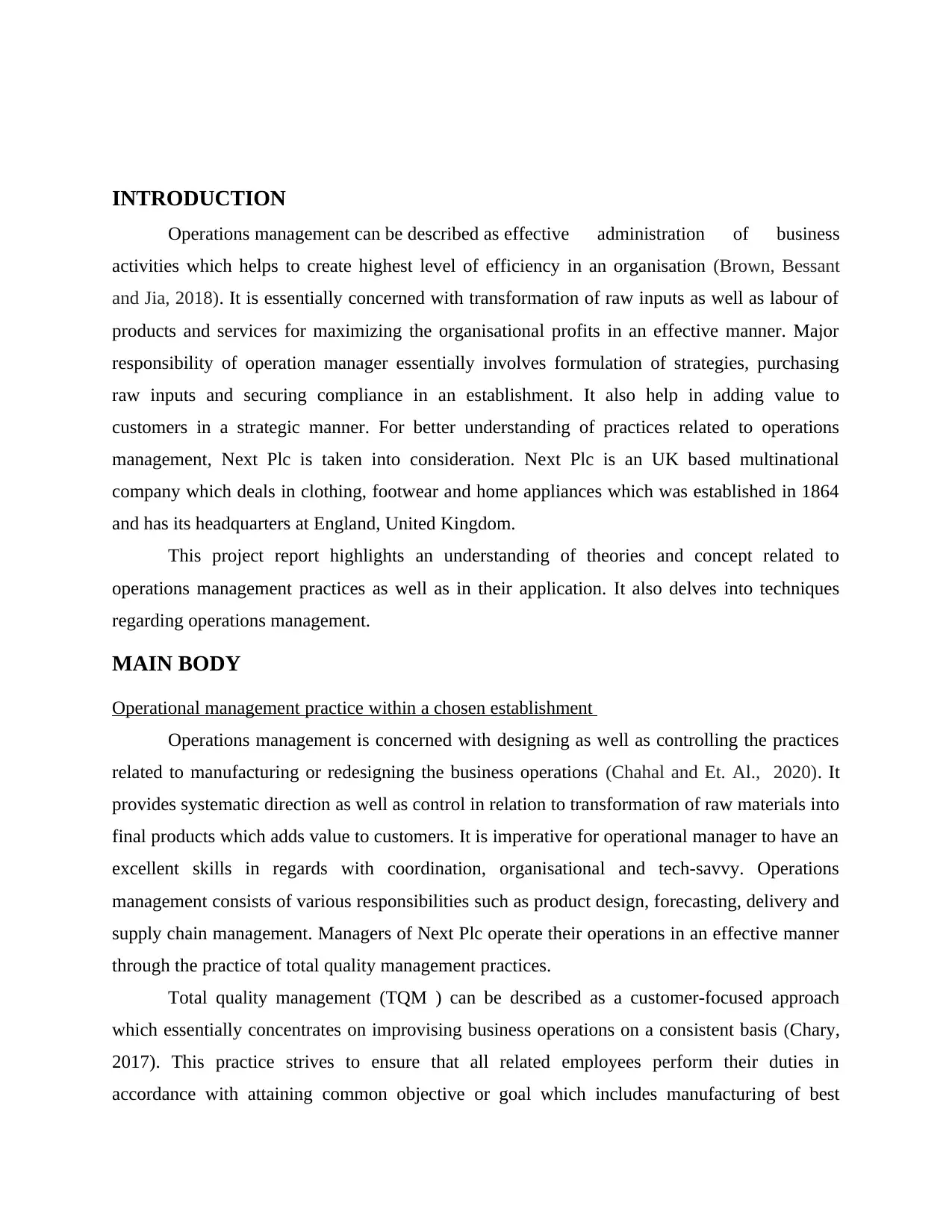
INTRODUCTION
Operations management can be described as effective administration of business
activities which helps to create highest level of efficiency in an organisation (Brown, Bessant
and Jia, 2018). It is essentially concerned with transformation of raw inputs as well as labour of
products and services for maximizing the organisational profits in an effective manner. Major
responsibility of operation manager essentially involves formulation of strategies, purchasing
raw inputs and securing compliance in an establishment. It also help in adding value to
customers in a strategic manner. For better understanding of practices related to operations
management, Next Plc is taken into consideration. Next Plc is an UK based multinational
company which deals in clothing, footwear and home appliances which was established in 1864
and has its headquarters at England, United Kingdom.
This project report highlights an understanding of theories and concept related to
operations management practices as well as in their application. It also delves into techniques
regarding operations management.
MAIN BODY
Operational management practice within a chosen establishment
Operations management is concerned with designing as well as controlling the practices
related to manufacturing or redesigning the business operations (Chahal and Et. Al., 2020). It
provides systematic direction as well as control in relation to transformation of raw materials into
final products which adds value to customers. It is imperative for operational manager to have an
excellent skills in regards with coordination, organisational and tech-savvy. Operations
management consists of various responsibilities such as product design, forecasting, delivery and
supply chain management. Managers of Next Plc operate their operations in an effective manner
through the practice of total quality management practices.
Total quality management (TQM ) can be described as a customer-focused approach
which essentially concentrates on improvising business operations on a consistent basis (Chary,
2017). This practice strives to ensure that all related employees perform their duties in
accordance with attaining common objective or goal which includes manufacturing of best
Operations management can be described as effective administration of business
activities which helps to create highest level of efficiency in an organisation (Brown, Bessant
and Jia, 2018). It is essentially concerned with transformation of raw inputs as well as labour of
products and services for maximizing the organisational profits in an effective manner. Major
responsibility of operation manager essentially involves formulation of strategies, purchasing
raw inputs and securing compliance in an establishment. It also help in adding value to
customers in a strategic manner. For better understanding of practices related to operations
management, Next Plc is taken into consideration. Next Plc is an UK based multinational
company which deals in clothing, footwear and home appliances which was established in 1864
and has its headquarters at England, United Kingdom.
This project report highlights an understanding of theories and concept related to
operations management practices as well as in their application. It also delves into techniques
regarding operations management.
MAIN BODY
Operational management practice within a chosen establishment
Operations management is concerned with designing as well as controlling the practices
related to manufacturing or redesigning the business operations (Chahal and Et. Al., 2020). It
provides systematic direction as well as control in relation to transformation of raw materials into
final products which adds value to customers. It is imperative for operational manager to have an
excellent skills in regards with coordination, organisational and tech-savvy. Operations
management consists of various responsibilities such as product design, forecasting, delivery and
supply chain management. Managers of Next Plc operate their operations in an effective manner
through the practice of total quality management practices.
Total quality management (TQM ) can be described as a customer-focused approach
which essentially concentrates on improvising business operations on a consistent basis (Chary,
2017). This practice strives to ensure that all related employees perform their duties in
accordance with attaining common objective or goal which includes manufacturing of best
⊘ This is a preview!⊘
Do you want full access?
Subscribe today to unlock all pages.

Trusted by 1+ million students worldwide
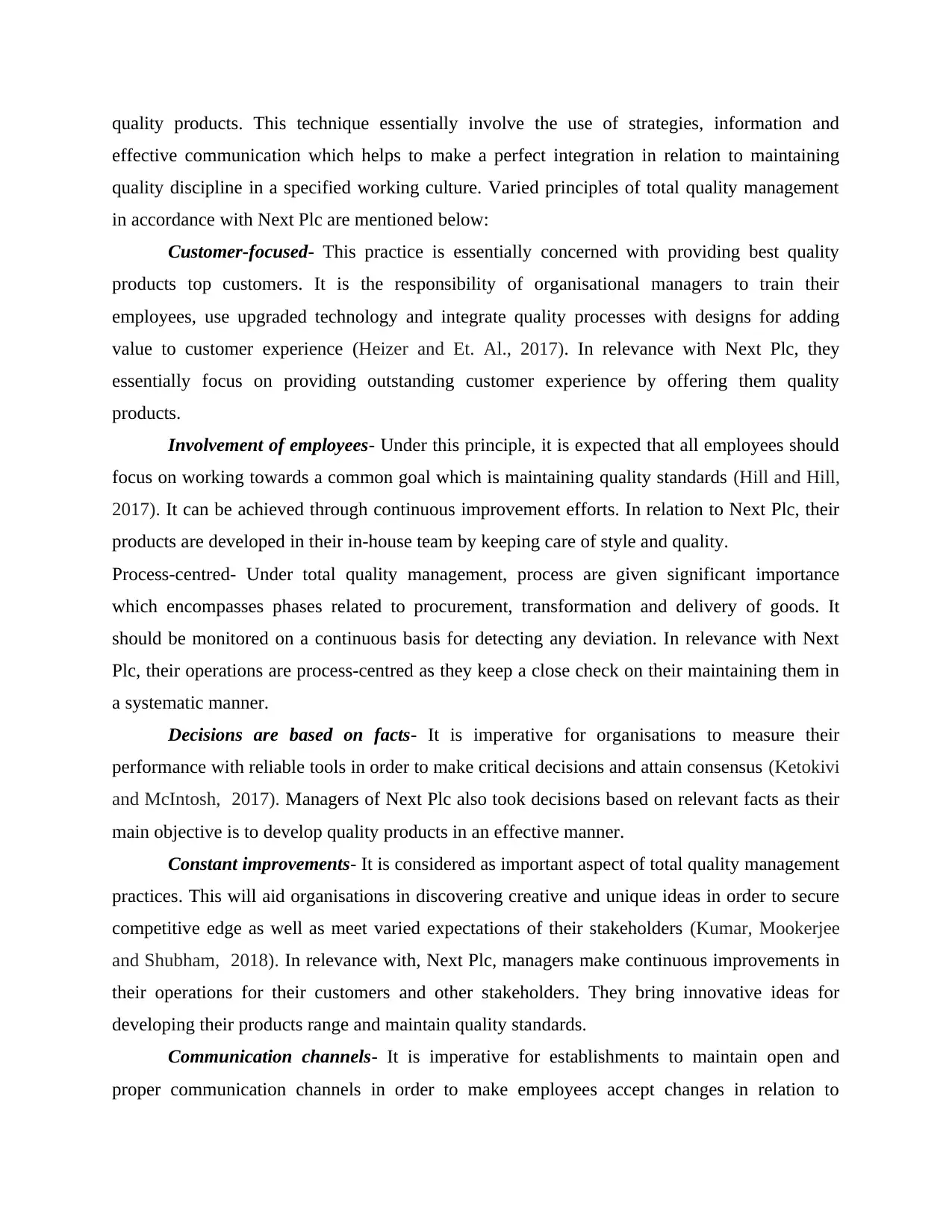
quality products. This technique essentially involve the use of strategies, information and
effective communication which helps to make a perfect integration in relation to maintaining
quality discipline in a specified working culture. Varied principles of total quality management
in accordance with Next Plc are mentioned below:
Customer-focused- This practice is essentially concerned with providing best quality
products top customers. It is the responsibility of organisational managers to train their
employees, use upgraded technology and integrate quality processes with designs for adding
value to customer experience (Heizer and Et. Al., 2017). In relevance with Next Plc, they
essentially focus on providing outstanding customer experience by offering them quality
products.
Involvement of employees- Under this principle, it is expected that all employees should
focus on working towards a common goal which is maintaining quality standards (Hill and Hill,
2017). It can be achieved through continuous improvement efforts. In relation to Next Plc, their
products are developed in their in-house team by keeping care of style and quality.
Process-centred- Under total quality management, process are given significant importance
which encompasses phases related to procurement, transformation and delivery of goods. It
should be monitored on a continuous basis for detecting any deviation. In relevance with Next
Plc, their operations are process-centred as they keep a close check on their maintaining them in
a systematic manner.
Decisions are based on facts- It is imperative for organisations to measure their
performance with reliable tools in order to make critical decisions and attain consensus (Ketokivi
and McIntosh, 2017). Managers of Next Plc also took decisions based on relevant facts as their
main objective is to develop quality products in an effective manner.
Constant improvements- It is considered as important aspect of total quality management
practices. This will aid organisations in discovering creative and unique ideas in order to secure
competitive edge as well as meet varied expectations of their stakeholders (Kumar, Mookerjee
and Shubham, 2018). In relevance with, Next Plc, managers make continuous improvements in
their operations for their customers and other stakeholders. They bring innovative ideas for
developing their products range and maintain quality standards.
Communication channels- It is imperative for establishments to maintain open and
proper communication channels in order to make employees accept changes in relation to
effective communication which helps to make a perfect integration in relation to maintaining
quality discipline in a specified working culture. Varied principles of total quality management
in accordance with Next Plc are mentioned below:
Customer-focused- This practice is essentially concerned with providing best quality
products top customers. It is the responsibility of organisational managers to train their
employees, use upgraded technology and integrate quality processes with designs for adding
value to customer experience (Heizer and Et. Al., 2017). In relevance with Next Plc, they
essentially focus on providing outstanding customer experience by offering them quality
products.
Involvement of employees- Under this principle, it is expected that all employees should
focus on working towards a common goal which is maintaining quality standards (Hill and Hill,
2017). It can be achieved through continuous improvement efforts. In relation to Next Plc, their
products are developed in their in-house team by keeping care of style and quality.
Process-centred- Under total quality management, process are given significant importance
which encompasses phases related to procurement, transformation and delivery of goods. It
should be monitored on a continuous basis for detecting any deviation. In relevance with Next
Plc, their operations are process-centred as they keep a close check on their maintaining them in
a systematic manner.
Decisions are based on facts- It is imperative for organisations to measure their
performance with reliable tools in order to make critical decisions and attain consensus (Ketokivi
and McIntosh, 2017). Managers of Next Plc also took decisions based on relevant facts as their
main objective is to develop quality products in an effective manner.
Constant improvements- It is considered as important aspect of total quality management
practices. This will aid organisations in discovering creative and unique ideas in order to secure
competitive edge as well as meet varied expectations of their stakeholders (Kumar, Mookerjee
and Shubham, 2018). In relevance with, Next Plc, managers make continuous improvements in
their operations for their customers and other stakeholders. They bring innovative ideas for
developing their products range and maintain quality standards.
Communication channels- It is imperative for establishments to maintain open and
proper communication channels in order to make employees accept changes in relation to
Paraphrase This Document
Need a fresh take? Get an instant paraphrase of this document with our AI Paraphraser
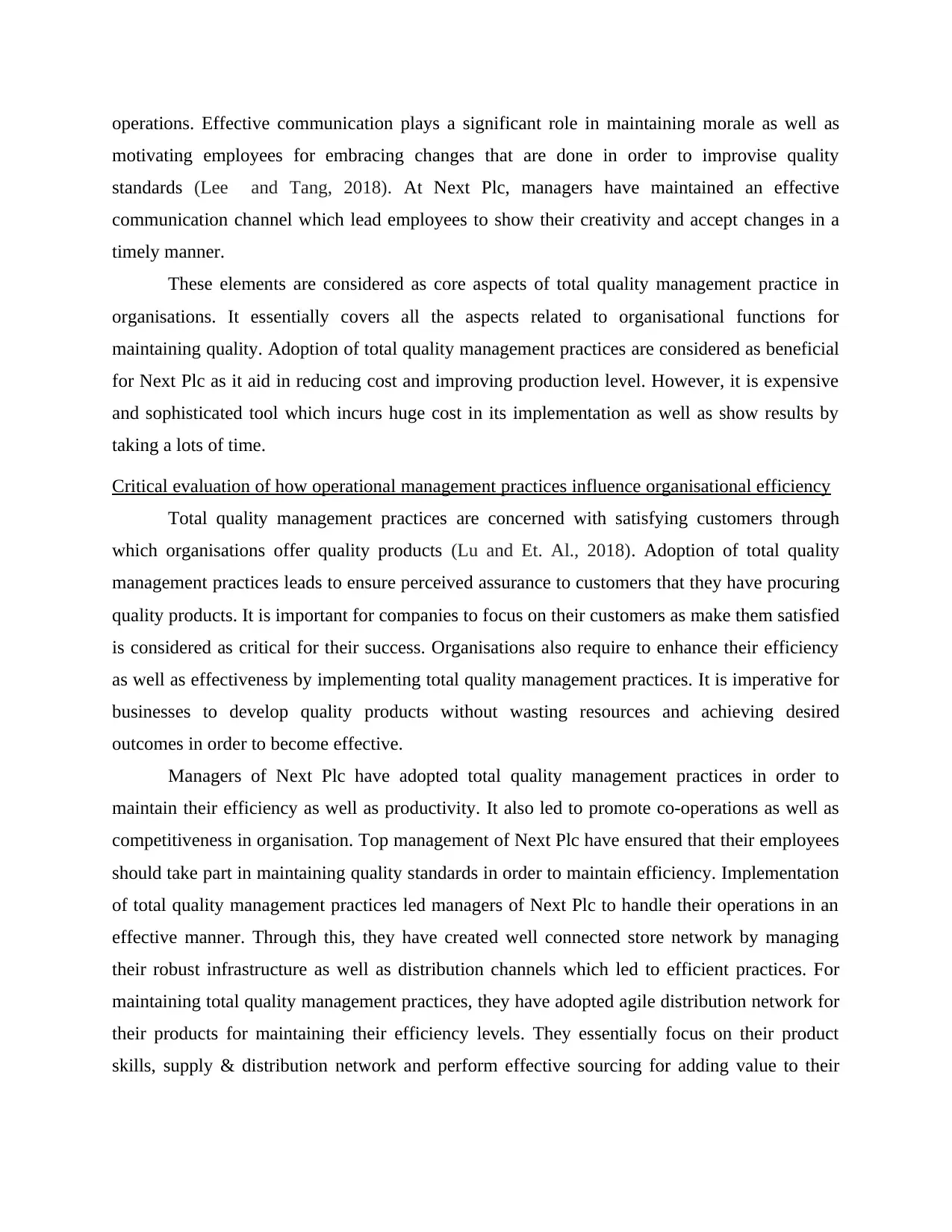
operations. Effective communication plays a significant role in maintaining morale as well as
motivating employees for embracing changes that are done in order to improvise quality
standards (Lee and Tang, 2018). At Next Plc, managers have maintained an effective
communication channel which lead employees to show their creativity and accept changes in a
timely manner.
These elements are considered as core aspects of total quality management practice in
organisations. It essentially covers all the aspects related to organisational functions for
maintaining quality. Adoption of total quality management practices are considered as beneficial
for Next Plc as it aid in reducing cost and improving production level. However, it is expensive
and sophisticated tool which incurs huge cost in its implementation as well as show results by
taking a lots of time.
Critical evaluation of how operational management practices influence organisational efficiency
Total quality management practices are concerned with satisfying customers through
which organisations offer quality products (Lu and Et. Al., 2018). Adoption of total quality
management practices leads to ensure perceived assurance to customers that they have procuring
quality products. It is important for companies to focus on their customers as make them satisfied
is considered as critical for their success. Organisations also require to enhance their efficiency
as well as effectiveness by implementing total quality management practices. It is imperative for
businesses to develop quality products without wasting resources and achieving desired
outcomes in order to become effective.
Managers of Next Plc have adopted total quality management practices in order to
maintain their efficiency as well as productivity. It also led to promote co-operations as well as
competitiveness in organisation. Top management of Next Plc have ensured that their employees
should take part in maintaining quality standards in order to maintain efficiency. Implementation
of total quality management practices led managers of Next Plc to handle their operations in an
effective manner. Through this, they have created well connected store network by managing
their robust infrastructure as well as distribution channels which led to efficient practices. For
maintaining total quality management practices, they have adopted agile distribution network for
their products for maintaining their efficiency levels. They essentially focus on their product
skills, supply & distribution network and perform effective sourcing for adding value to their
motivating employees for embracing changes that are done in order to improvise quality
standards (Lee and Tang, 2018). At Next Plc, managers have maintained an effective
communication channel which lead employees to show their creativity and accept changes in a
timely manner.
These elements are considered as core aspects of total quality management practice in
organisations. It essentially covers all the aspects related to organisational functions for
maintaining quality. Adoption of total quality management practices are considered as beneficial
for Next Plc as it aid in reducing cost and improving production level. However, it is expensive
and sophisticated tool which incurs huge cost in its implementation as well as show results by
taking a lots of time.
Critical evaluation of how operational management practices influence organisational efficiency
Total quality management practices are concerned with satisfying customers through
which organisations offer quality products (Lu and Et. Al., 2018). Adoption of total quality
management practices leads to ensure perceived assurance to customers that they have procuring
quality products. It is important for companies to focus on their customers as make them satisfied
is considered as critical for their success. Organisations also require to enhance their efficiency
as well as effectiveness by implementing total quality management practices. It is imperative for
businesses to develop quality products without wasting resources and achieving desired
outcomes in order to become effective.
Managers of Next Plc have adopted total quality management practices in order to
maintain their efficiency as well as productivity. It also led to promote co-operations as well as
competitiveness in organisation. Top management of Next Plc have ensured that their employees
should take part in maintaining quality standards in order to maintain efficiency. Implementation
of total quality management practices led managers of Next Plc to handle their operations in an
effective manner. Through this, they have created well connected store network by managing
their robust infrastructure as well as distribution channels which led to efficient practices. For
maintaining total quality management practices, they have adopted agile distribution network for
their products for maintaining their efficiency levels. They essentially focus on their product
skills, supply & distribution network and perform effective sourcing for adding value to their
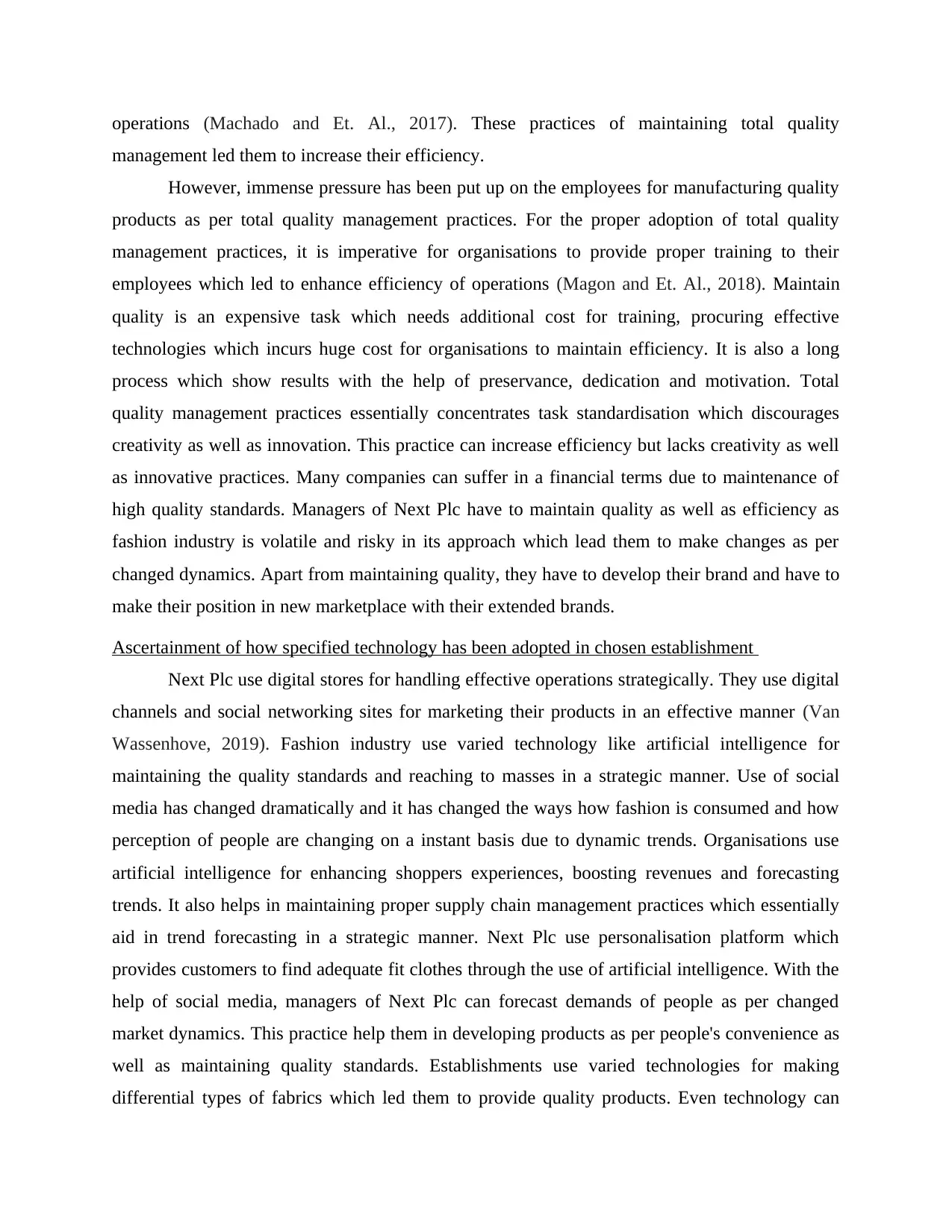
operations (Machado and Et. Al., 2017). These practices of maintaining total quality
management led them to increase their efficiency.
However, immense pressure has been put up on the employees for manufacturing quality
products as per total quality management practices. For the proper adoption of total quality
management practices, it is imperative for organisations to provide proper training to their
employees which led to enhance efficiency of operations (Magon and Et. Al., 2018). Maintain
quality is an expensive task which needs additional cost for training, procuring effective
technologies which incurs huge cost for organisations to maintain efficiency. It is also a long
process which show results with the help of preservance, dedication and motivation. Total
quality management practices essentially concentrates task standardisation which discourages
creativity as well as innovation. This practice can increase efficiency but lacks creativity as well
as innovative practices. Many companies can suffer in a financial terms due to maintenance of
high quality standards. Managers of Next Plc have to maintain quality as well as efficiency as
fashion industry is volatile and risky in its approach which lead them to make changes as per
changed dynamics. Apart from maintaining quality, they have to develop their brand and have to
make their position in new marketplace with their extended brands.
Ascertainment of how specified technology has been adopted in chosen establishment
Next Plc use digital stores for handling effective operations strategically. They use digital
channels and social networking sites for marketing their products in an effective manner (Van
Wassenhove, 2019). Fashion industry use varied technology like artificial intelligence for
maintaining the quality standards and reaching to masses in a strategic manner. Use of social
media has changed dramatically and it has changed the ways how fashion is consumed and how
perception of people are changing on a instant basis due to dynamic trends. Organisations use
artificial intelligence for enhancing shoppers experiences, boosting revenues and forecasting
trends. It also helps in maintaining proper supply chain management practices which essentially
aid in trend forecasting in a strategic manner. Next Plc use personalisation platform which
provides customers to find adequate fit clothes through the use of artificial intelligence. With the
help of social media, managers of Next Plc can forecast demands of people as per changed
market dynamics. This practice help them in developing products as per people's convenience as
well as maintaining quality standards. Establishments use varied technologies for making
differential types of fabrics which led them to provide quality products. Even technology can
management led them to increase their efficiency.
However, immense pressure has been put up on the employees for manufacturing quality
products as per total quality management practices. For the proper adoption of total quality
management practices, it is imperative for organisations to provide proper training to their
employees which led to enhance efficiency of operations (Magon and Et. Al., 2018). Maintain
quality is an expensive task which needs additional cost for training, procuring effective
technologies which incurs huge cost for organisations to maintain efficiency. It is also a long
process which show results with the help of preservance, dedication and motivation. Total
quality management practices essentially concentrates task standardisation which discourages
creativity as well as innovation. This practice can increase efficiency but lacks creativity as well
as innovative practices. Many companies can suffer in a financial terms due to maintenance of
high quality standards. Managers of Next Plc have to maintain quality as well as efficiency as
fashion industry is volatile and risky in its approach which lead them to make changes as per
changed dynamics. Apart from maintaining quality, they have to develop their brand and have to
make their position in new marketplace with their extended brands.
Ascertainment of how specified technology has been adopted in chosen establishment
Next Plc use digital stores for handling effective operations strategically. They use digital
channels and social networking sites for marketing their products in an effective manner (Van
Wassenhove, 2019). Fashion industry use varied technology like artificial intelligence for
maintaining the quality standards and reaching to masses in a strategic manner. Use of social
media has changed dramatically and it has changed the ways how fashion is consumed and how
perception of people are changing on a instant basis due to dynamic trends. Organisations use
artificial intelligence for enhancing shoppers experiences, boosting revenues and forecasting
trends. It also helps in maintaining proper supply chain management practices which essentially
aid in trend forecasting in a strategic manner. Next Plc use personalisation platform which
provides customers to find adequate fit clothes through the use of artificial intelligence. With the
help of social media, managers of Next Plc can forecast demands of people as per changed
market dynamics. This practice help them in developing products as per people's convenience as
well as maintaining quality standards. Establishments use varied technologies for making
differential types of fabrics which led them to provide quality products. Even technology can
⊘ This is a preview!⊘
Do you want full access?
Subscribe today to unlock all pages.

Trusted by 1+ million students worldwide
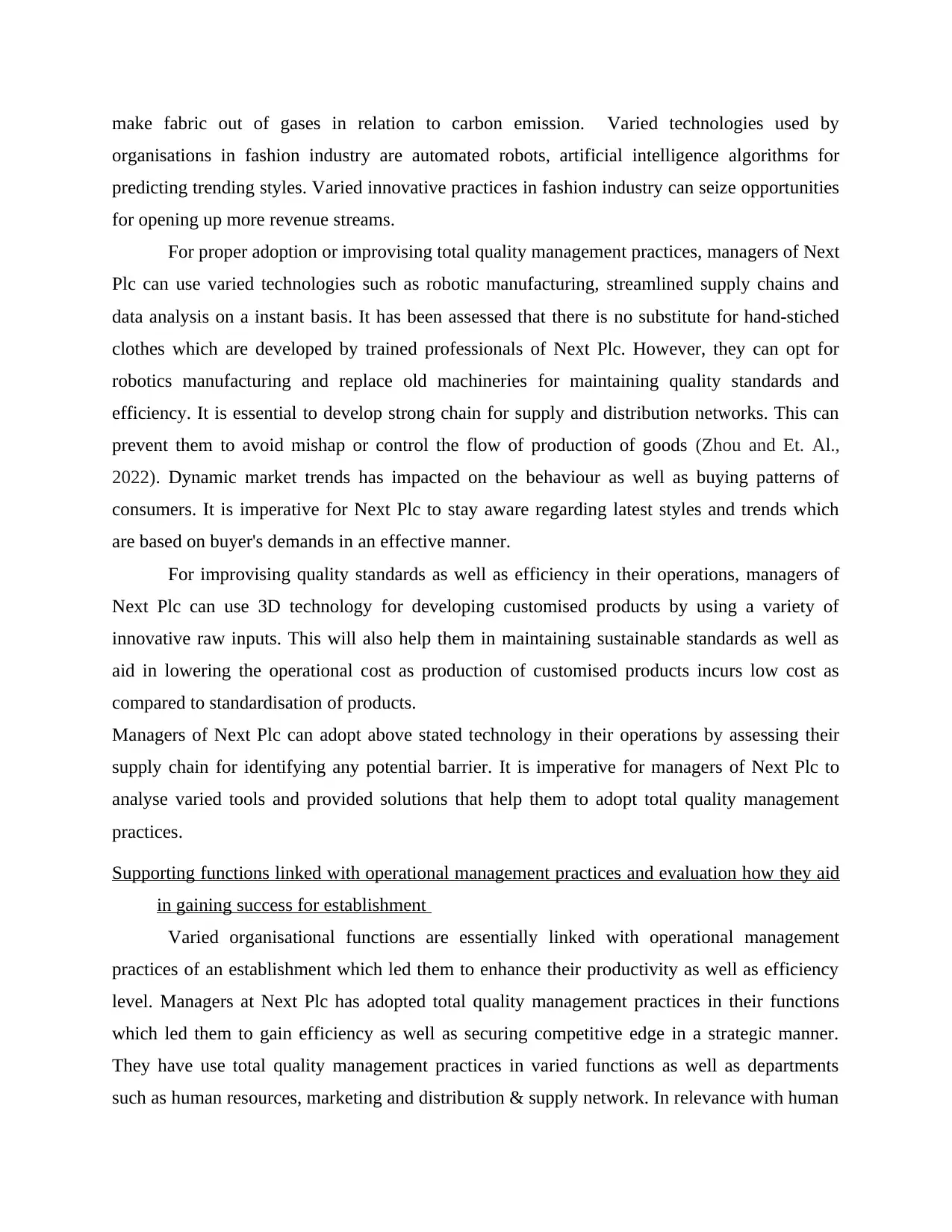
make fabric out of gases in relation to carbon emission. Varied technologies used by
organisations in fashion industry are automated robots, artificial intelligence algorithms for
predicting trending styles. Varied innovative practices in fashion industry can seize opportunities
for opening up more revenue streams.
For proper adoption or improvising total quality management practices, managers of Next
Plc can use varied technologies such as robotic manufacturing, streamlined supply chains and
data analysis on a instant basis. It has been assessed that there is no substitute for hand-stiched
clothes which are developed by trained professionals of Next Plc. However, they can opt for
robotics manufacturing and replace old machineries for maintaining quality standards and
efficiency. It is essential to develop strong chain for supply and distribution networks. This can
prevent them to avoid mishap or control the flow of production of goods (Zhou and Et. Al.,
2022). Dynamic market trends has impacted on the behaviour as well as buying patterns of
consumers. It is imperative for Next Plc to stay aware regarding latest styles and trends which
are based on buyer's demands in an effective manner.
For improvising quality standards as well as efficiency in their operations, managers of
Next Plc can use 3D technology for developing customised products by using a variety of
innovative raw inputs. This will also help them in maintaining sustainable standards as well as
aid in lowering the operational cost as production of customised products incurs low cost as
compared to standardisation of products.
Managers of Next Plc can adopt above stated technology in their operations by assessing their
supply chain for identifying any potential barrier. It is imperative for managers of Next Plc to
analyse varied tools and provided solutions that help them to adopt total quality management
practices.
Supporting functions linked with operational management practices and evaluation how they aid
in gaining success for establishment
Varied organisational functions are essentially linked with operational management
practices of an establishment which led them to enhance their productivity as well as efficiency
level. Managers at Next Plc has adopted total quality management practices in their functions
which led them to gain efficiency as well as securing competitive edge in a strategic manner.
They have use total quality management practices in varied functions as well as departments
such as human resources, marketing and distribution & supply network. In relevance with human
organisations in fashion industry are automated robots, artificial intelligence algorithms for
predicting trending styles. Varied innovative practices in fashion industry can seize opportunities
for opening up more revenue streams.
For proper adoption or improvising total quality management practices, managers of Next
Plc can use varied technologies such as robotic manufacturing, streamlined supply chains and
data analysis on a instant basis. It has been assessed that there is no substitute for hand-stiched
clothes which are developed by trained professionals of Next Plc. However, they can opt for
robotics manufacturing and replace old machineries for maintaining quality standards and
efficiency. It is essential to develop strong chain for supply and distribution networks. This can
prevent them to avoid mishap or control the flow of production of goods (Zhou and Et. Al.,
2022). Dynamic market trends has impacted on the behaviour as well as buying patterns of
consumers. It is imperative for Next Plc to stay aware regarding latest styles and trends which
are based on buyer's demands in an effective manner.
For improvising quality standards as well as efficiency in their operations, managers of
Next Plc can use 3D technology for developing customised products by using a variety of
innovative raw inputs. This will also help them in maintaining sustainable standards as well as
aid in lowering the operational cost as production of customised products incurs low cost as
compared to standardisation of products.
Managers of Next Plc can adopt above stated technology in their operations by assessing their
supply chain for identifying any potential barrier. It is imperative for managers of Next Plc to
analyse varied tools and provided solutions that help them to adopt total quality management
practices.
Supporting functions linked with operational management practices and evaluation how they aid
in gaining success for establishment
Varied organisational functions are essentially linked with operational management
practices of an establishment which led them to enhance their productivity as well as efficiency
level. Managers at Next Plc has adopted total quality management practices in their functions
which led them to gain efficiency as well as securing competitive edge in a strategic manner.
They have use total quality management practices in varied functions as well as departments
such as human resources, marketing and distribution & supply network. In relevance with human
Paraphrase This Document
Need a fresh take? Get an instant paraphrase of this document with our AI Paraphraser
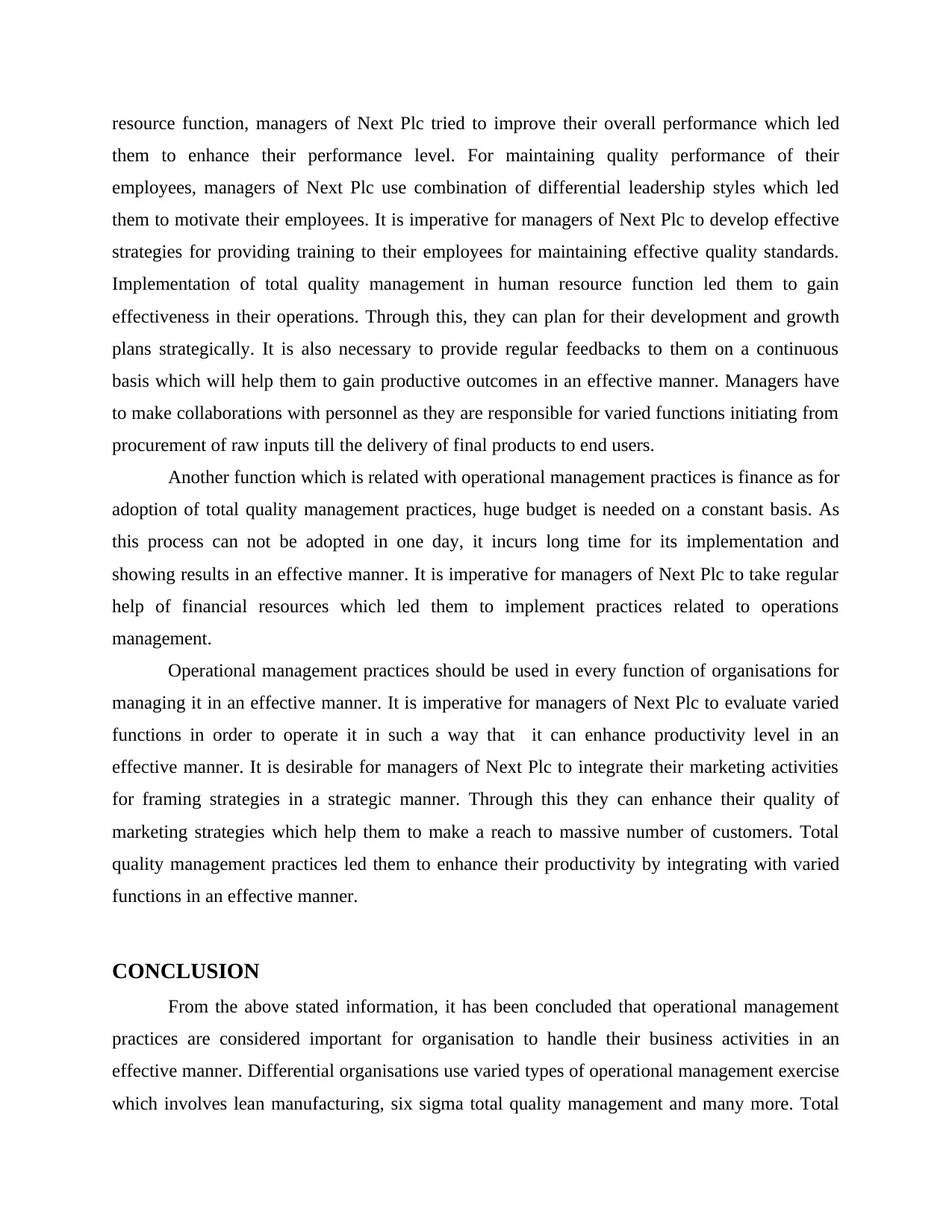
resource function, managers of Next Plc tried to improve their overall performance which led
them to enhance their performance level. For maintaining quality performance of their
employees, managers of Next Plc use combination of differential leadership styles which led
them to motivate their employees. It is imperative for managers of Next Plc to develop effective
strategies for providing training to their employees for maintaining effective quality standards.
Implementation of total quality management in human resource function led them to gain
effectiveness in their operations. Through this, they can plan for their development and growth
plans strategically. It is also necessary to provide regular feedbacks to them on a continuous
basis which will help them to gain productive outcomes in an effective manner. Managers have
to make collaborations with personnel as they are responsible for varied functions initiating from
procurement of raw inputs till the delivery of final products to end users.
Another function which is related with operational management practices is finance as for
adoption of total quality management practices, huge budget is needed on a constant basis. As
this process can not be adopted in one day, it incurs long time for its implementation and
showing results in an effective manner. It is imperative for managers of Next Plc to take regular
help of financial resources which led them to implement practices related to operations
management.
Operational management practices should be used in every function of organisations for
managing it in an effective manner. It is imperative for managers of Next Plc to evaluate varied
functions in order to operate it in such a way that it can enhance productivity level in an
effective manner. It is desirable for managers of Next Plc to integrate their marketing activities
for framing strategies in a strategic manner. Through this they can enhance their quality of
marketing strategies which help them to make a reach to massive number of customers. Total
quality management practices led them to enhance their productivity by integrating with varied
functions in an effective manner.
CONCLUSION
From the above stated information, it has been concluded that operational management
practices are considered important for organisation to handle their business activities in an
effective manner. Differential organisations use varied types of operational management exercise
which involves lean manufacturing, six sigma total quality management and many more. Total
them to enhance their performance level. For maintaining quality performance of their
employees, managers of Next Plc use combination of differential leadership styles which led
them to motivate their employees. It is imperative for managers of Next Plc to develop effective
strategies for providing training to their employees for maintaining effective quality standards.
Implementation of total quality management in human resource function led them to gain
effectiveness in their operations. Through this, they can plan for their development and growth
plans strategically. It is also necessary to provide regular feedbacks to them on a continuous
basis which will help them to gain productive outcomes in an effective manner. Managers have
to make collaborations with personnel as they are responsible for varied functions initiating from
procurement of raw inputs till the delivery of final products to end users.
Another function which is related with operational management practices is finance as for
adoption of total quality management practices, huge budget is needed on a constant basis. As
this process can not be adopted in one day, it incurs long time for its implementation and
showing results in an effective manner. It is imperative for managers of Next Plc to take regular
help of financial resources which led them to implement practices related to operations
management.
Operational management practices should be used in every function of organisations for
managing it in an effective manner. It is imperative for managers of Next Plc to evaluate varied
functions in order to operate it in such a way that it can enhance productivity level in an
effective manner. It is desirable for managers of Next Plc to integrate their marketing activities
for framing strategies in a strategic manner. Through this they can enhance their quality of
marketing strategies which help them to make a reach to massive number of customers. Total
quality management practices led them to enhance their productivity by integrating with varied
functions in an effective manner.
CONCLUSION
From the above stated information, it has been concluded that operational management
practices are considered important for organisation to handle their business activities in an
effective manner. Differential organisations use varied types of operational management exercise
which involves lean manufacturing, six sigma total quality management and many more. Total
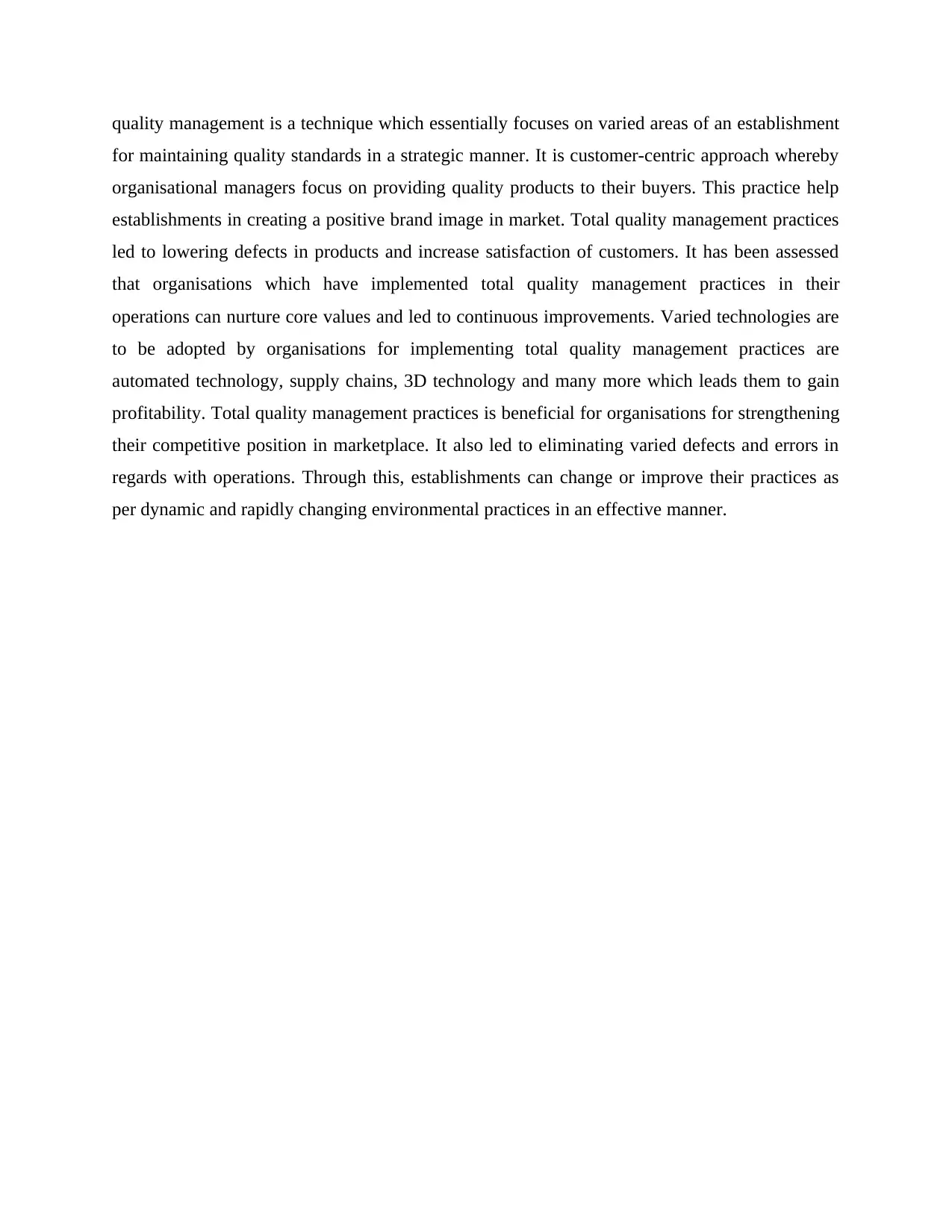
quality management is a technique which essentially focuses on varied areas of an establishment
for maintaining quality standards in a strategic manner. It is customer-centric approach whereby
organisational managers focus on providing quality products to their buyers. This practice help
establishments in creating a positive brand image in market. Total quality management practices
led to lowering defects in products and increase satisfaction of customers. It has been assessed
that organisations which have implemented total quality management practices in their
operations can nurture core values and led to continuous improvements. Varied technologies are
to be adopted by organisations for implementing total quality management practices are
automated technology, supply chains, 3D technology and many more which leads them to gain
profitability. Total quality management practices is beneficial for organisations for strengthening
their competitive position in marketplace. It also led to eliminating varied defects and errors in
regards with operations. Through this, establishments can change or improve their practices as
per dynamic and rapidly changing environmental practices in an effective manner.
for maintaining quality standards in a strategic manner. It is customer-centric approach whereby
organisational managers focus on providing quality products to their buyers. This practice help
establishments in creating a positive brand image in market. Total quality management practices
led to lowering defects in products and increase satisfaction of customers. It has been assessed
that organisations which have implemented total quality management practices in their
operations can nurture core values and led to continuous improvements. Varied technologies are
to be adopted by organisations for implementing total quality management practices are
automated technology, supply chains, 3D technology and many more which leads them to gain
profitability. Total quality management practices is beneficial for organisations for strengthening
their competitive position in marketplace. It also led to eliminating varied defects and errors in
regards with operations. Through this, establishments can change or improve their practices as
per dynamic and rapidly changing environmental practices in an effective manner.
⊘ This is a preview!⊘
Do you want full access?
Subscribe today to unlock all pages.

Trusted by 1+ million students worldwide
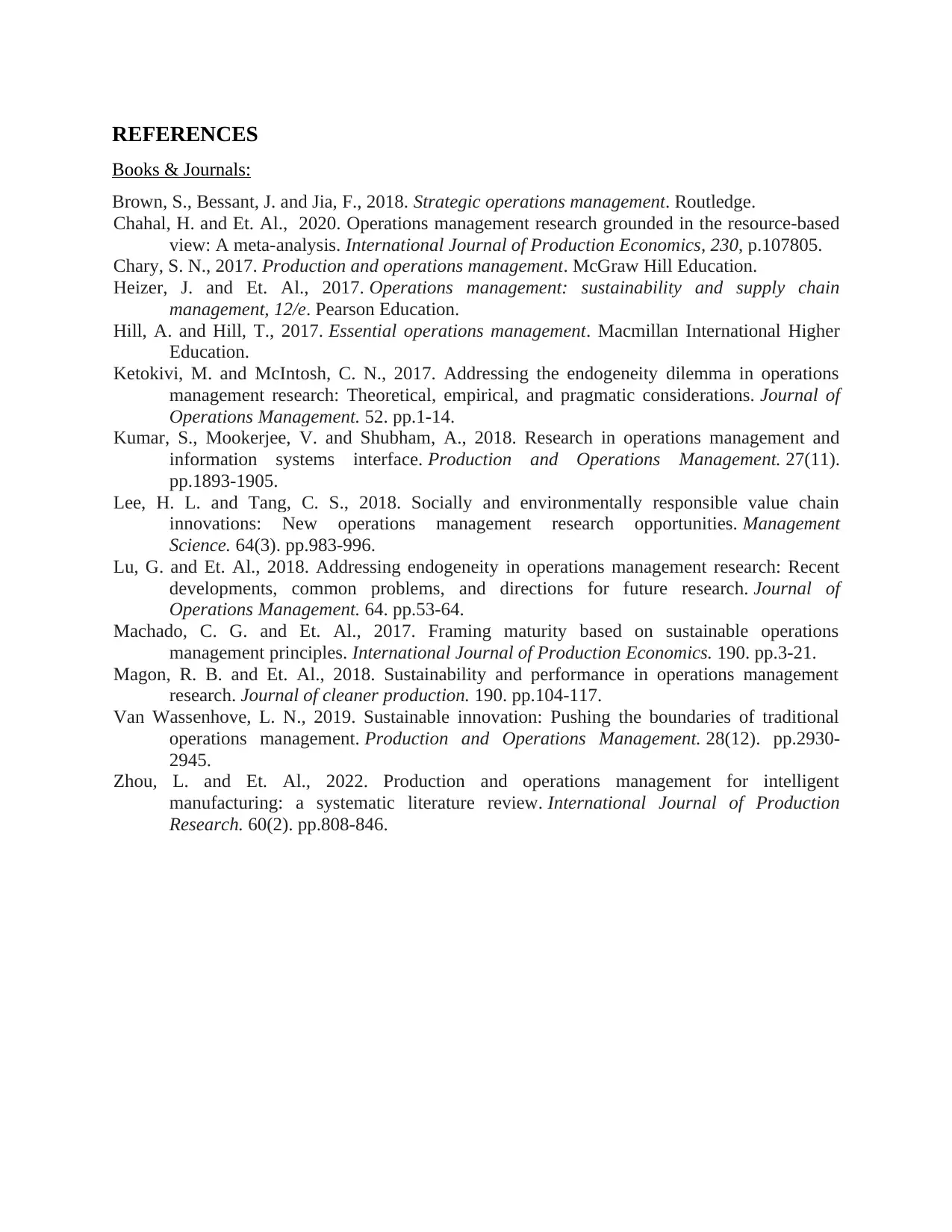
REFERENCES
Books & Journals:
Brown, S., Bessant, J. and Jia, F., 2018. Strategic operations management. Routledge.
Chahal, H. and Et. Al., 2020. Operations management research grounded in the resource-based
view: A meta-analysis. International Journal of Production Economics, 230, p.107805.
Chary, S. N., 2017. Production and operations management. McGraw Hill Education.
Heizer, J. and Et. Al., 2017. Operations management: sustainability and supply chain
management, 12/e. Pearson Education.
Hill, A. and Hill, T., 2017. Essential operations management. Macmillan International Higher
Education.
Ketokivi, M. and McIntosh, C. N., 2017. Addressing the endogeneity dilemma in operations
management research: Theoretical, empirical, and pragmatic considerations. Journal of
Operations Management. 52. pp.1-14.
Kumar, S., Mookerjee, V. and Shubham, A., 2018. Research in operations management and
information systems interface. Production and Operations Management. 27(11).
pp.1893-1905.
Lee, H. L. and Tang, C. S., 2018. Socially and environmentally responsible value chain
innovations: New operations management research opportunities. Management
Science. 64(3). pp.983-996.
Lu, G. and Et. Al., 2018. Addressing endogeneity in operations management research: Recent
developments, common problems, and directions for future research. Journal of
Operations Management. 64. pp.53-64.
Machado, C. G. and Et. Al., 2017. Framing maturity based on sustainable operations
management principles. International Journal of Production Economics. 190. pp.3-21.
Magon, R. B. and Et. Al., 2018. Sustainability and performance in operations management
research. Journal of cleaner production. 190. pp.104-117.
Van Wassenhove, L. N., 2019. Sustainable innovation: Pushing the boundaries of traditional
operations management. Production and Operations Management. 28(12). pp.2930-
2945.
Zhou, L. and Et. Al., 2022. Production and operations management for intelligent
manufacturing: a systematic literature review. International Journal of Production
Research. 60(2). pp.808-846.
Books & Journals:
Brown, S., Bessant, J. and Jia, F., 2018. Strategic operations management. Routledge.
Chahal, H. and Et. Al., 2020. Operations management research grounded in the resource-based
view: A meta-analysis. International Journal of Production Economics, 230, p.107805.
Chary, S. N., 2017. Production and operations management. McGraw Hill Education.
Heizer, J. and Et. Al., 2017. Operations management: sustainability and supply chain
management, 12/e. Pearson Education.
Hill, A. and Hill, T., 2017. Essential operations management. Macmillan International Higher
Education.
Ketokivi, M. and McIntosh, C. N., 2017. Addressing the endogeneity dilemma in operations
management research: Theoretical, empirical, and pragmatic considerations. Journal of
Operations Management. 52. pp.1-14.
Kumar, S., Mookerjee, V. and Shubham, A., 2018. Research in operations management and
information systems interface. Production and Operations Management. 27(11).
pp.1893-1905.
Lee, H. L. and Tang, C. S., 2018. Socially and environmentally responsible value chain
innovations: New operations management research opportunities. Management
Science. 64(3). pp.983-996.
Lu, G. and Et. Al., 2018. Addressing endogeneity in operations management research: Recent
developments, common problems, and directions for future research. Journal of
Operations Management. 64. pp.53-64.
Machado, C. G. and Et. Al., 2017. Framing maturity based on sustainable operations
management principles. International Journal of Production Economics. 190. pp.3-21.
Magon, R. B. and Et. Al., 2018. Sustainability and performance in operations management
research. Journal of cleaner production. 190. pp.104-117.
Van Wassenhove, L. N., 2019. Sustainable innovation: Pushing the boundaries of traditional
operations management. Production and Operations Management. 28(12). pp.2930-
2945.
Zhou, L. and Et. Al., 2022. Production and operations management for intelligent
manufacturing: a systematic literature review. International Journal of Production
Research. 60(2). pp.808-846.
1 out of 10
Related Documents
Your All-in-One AI-Powered Toolkit for Academic Success.
+13062052269
info@desklib.com
Available 24*7 on WhatsApp / Email
![[object Object]](/_next/static/media/star-bottom.7253800d.svg)
Unlock your academic potential
Copyright © 2020–2026 A2Z Services. All Rights Reserved. Developed and managed by ZUCOL.





